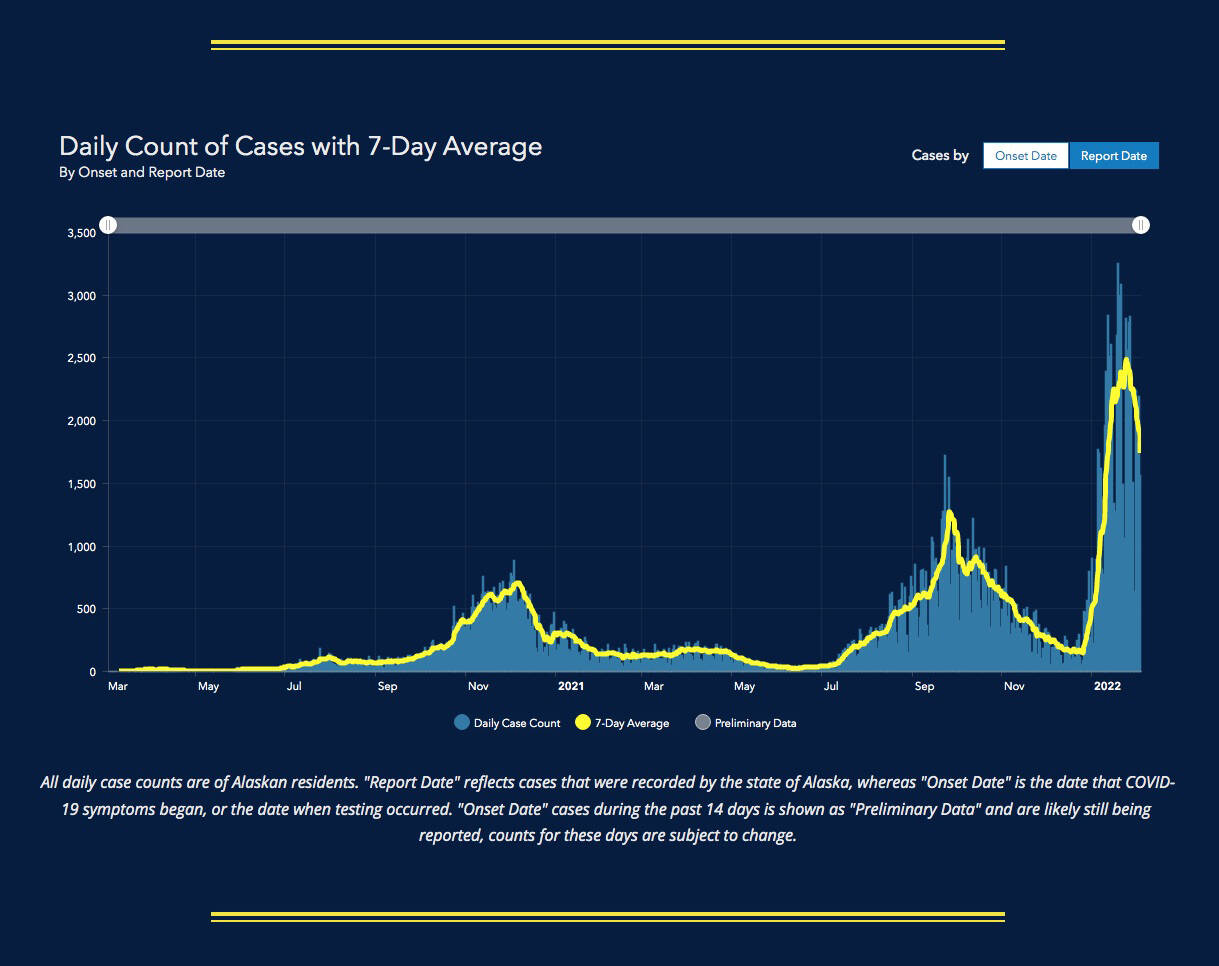Data from the state Department of Health and Social Services on Friday showed a drop in new COVID-19 cases from last week, although Alaska still remained at a high alert level. The statewide COVID cases for the week of Jan. 21 through Jan. 27 were 16,623. This past week — from Jan. 28 to Feb. 3 — cases fell 27%, down to 12,149.
Chief Medical Officer Dr. Anne Zink said during a Thursday press briefing that about 98.46% of new cases in Alaska have been caused by the omicron variant — and even some by its new BA.2 form.
The new omicron subvariant, BA.2, or the “stealth” variant, is reportedly not much different from the original form of omicron. Health officials said last week that BA.2 trends still show the subvariant is causing less severe illness, and that approved COVID vaccines still offer robust protection.
Jayme Parker, the section chief of the Alaska public health laboratories, confirmed that five BA.2 cases had been identified in the state as of last Thursday afternoon.
According to data from the New York Times on Friday, the 14-day change of cases in the country was down 52%. Cases in the United States have been dropping swiftly since Jan. 15, although Alaska is still reporting the most new COVID infections per capita behind Guam.
The state reported a two-day combined total of 3,830 new cases sequenced from Feb. 2-3. The average number of daily cases over the past week as of Friday fell to 1,666.8 per 100,000 people, which still surpasses the threshold for high risk over 16 times. This seven-day average figure estimates a daily case count proportionate to population by averaging the actual number of reported cases each day over the previous week.
New cases reported Friday included 83 in Soldotna, 76 in Kenai, 45 in Homer, 21 in the Kenai Peninsula Borough South, 17 in Seward, 14 in the Kenai Peninsula Borough North, 10 in Anchor Point, seven in Nikiski, and six in Sterling. Because many omicron cases have reportedly been less symptomatic, and because of the increasing availability of at-home COVID test kits, state officials with the DHSS are encouraging people to use hospitalizations and death metrics to determine the severity of the state’s COVID spread.
There were a total of 169 COVID-related hospitalizations in Alaska as of Friday, with four of those patients on ventilators.
Health experts widely agree getting vaccinated against COVID will help slow the spread and protect people from severe illness, hospitalization and death.
The Pfizer-BioNTech vaccine is approved for everyone 5 years and older, while the Moderna and Johnson & Johnson/Janssen vaccines are approved for anyone 18 and older.
Moderna’s vaccine also got fully approved by the Food and Drug Administration for those 18 and older last week, and Pfizer’s vaccine got full FDA authorization for people 16 and older last August.
In addition to a primary series — two doses of the Pfizer or Moderna vaccine or one dose of the Janssen vaccine — experts are strongly encouraging booster shots to protect against omicron.
Health officials said studies indicate a person with their primary series is expected to be about 35% protected against omicron, and 75% protected with a booster dose.
The FDA and Centers for Disease Control and Prevention are recommending Pfizer boosters for anyone 12 and older at least five months after the primary series. Additionally, Moderna boosters are recommended for anyone 18 and older at least six months after a primary series.
Janssen boosters are approved for anyone 18 and older at least two months after initial vaccination, although the FDA announced it was revising its fact sheet for the Janssen shot to include more data on the risks of blood clotting associated with the vaccine.
According to the DHSS Facebook page, the state is recommending people with a primary Janssen vaccine to get either a Pfizer or Moderna booster for more robust protection.
Getting a vaccine
COVID-19 vaccines do not cost money.
Many organizations on the central peninsula — including Walmart, Walgreens, the Kenai Fire Department and Kenai Public Health — offer vaccines.
Additionally, Soldotna Professional Pharmacy hosts a walk-in clinic in its strip mall storefront at the “Y” intersection of the Sterling and Kenai Spur highways. The clinic is open from noon to 6 p.m. Monday through Friday and 10 a.m. to 2 p.m. on Saturday.
Vaccination appointments can also be scheduled through the online portal PrepMod, which can be accessed at myhealth.alaska.gov.
A map of vaccine providers can be found on DHSS’ COVID-19 vaccine website at covidvax.alaska.gov.
People who would like assistance scheduling a vaccination appointment can call the Kenai Peninsula Borough Office of Emergency Management call center. The center operates Monday through Friday from 9 a.m. to noon. The central peninsula call center can be reached at 907-262-4636. The Homer call center can be reached at 907-235-4636. The Seward call center can be reached at 907-224-4636.
Testing locations
Officials encourage anyone with symptoms to test for COVID-19, despite vaccination status.
In Kenai, testing is available at Odyssey Family Practice, Kenai Public Health Center and Capstone Clinic. At-home test kits are also available for free at Kenai Public Health.
In Soldotna, testing is available at the Peninsula Community Health Center, Urgent Care of Soldotna, Walgreens and Soldotna Professional Pharmacy.
In Homer, testing is available at South Peninsula Hospital, or through other area health care providers at Seldovia Village Tribe Health and Wellness, Kachemak Medical Group and Homer Medical Center. In addition, Capstone Clinic in Homer will be offering drive-thru tests Monday through Friday from 9 a.m. to 4 p.m. through Friday. Register with the COVID Secure App before arriving.
In Seward, testing is available at Providence Medical Center, Chugachmiut-North Star Health Clinic, Glacier Family Medicine, Seward Community Health Center and the Safeway pharmacy.

